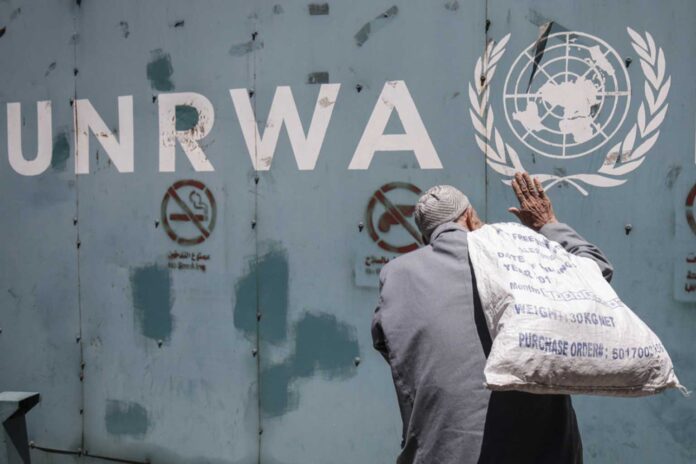United Nations, the world’s only truly universal global organization, was rocked by shocking allegations recently that UN staffers at the specialized Agency UNRWA, The United Nations Relief and Works Agency for Palestine Refugees in the Near East, were involved in the horrific Oct 7 massacre and attacks on Israel. This is the first time in UN History that its employees have been accused of grave crimes like terrorism and the situation now presents one of the greatest credibility challenges facing the UN System and specially UNRWA as an entity.
The United Nations Secretary General, Antonio Guterres has said that he is “horrified by these accusations” and has appointed an Independent Panel to review UNRWA and it’s working. UNRWA itself has fired 12 accused employees as the investigations proceed and about 18 countries, many of them major donors, have suspended funding to the organization such as the United States, Germany, European Union, Sweden, Japan, France, Switzerland, Canada, United Kingdom, The Netherlands, Australia, Italy, Austria, Finland, New Zealand, Iceland, Romania and Estonia.
These unprecedented and rapid developments have raised several pertinent questions, many of them directed at the UN, UNRWA and Israel, even as the 4 month long war rages in Gaza, with the IDF [Israel Defense Forces] announcing their intent to enter Rafah, the southernmost major Palestinian city at the Egyptian border. Israel has said that moving in on Rafah is a ‘military necessity’ in pursuit of their ‘total victory against Hamas.’ The IDF wants to get into the tunnels in Rafah and get more than a 100 Israeli hostages back. With Gaza being the most densely populated area of the world, an already dire humanitarian catastrophe is on the verge of becoming the great human tragedy of our times. Thus what do the allegations against UNRWA mean at this time? Especially for the people of Gaza?
UNRWA: A Lifeline for Palestinian Refugees
Established by the UN General Assembly in 1949, UNRWA has been pivotal in providing essential services to Palestinian refugees displaced by the 1948 conflict preceding Israel’s creation. Today, it supports over six million Palestinian refugees across the Middle East, notably in Gaza, where it func- tions as the principal humanitarian agency.
Distinctive Mandate
Separate from the United Nations High Commissioner for Refugees (UNHCR), UNRWA specifically addresses the needs of Palestinian refugees, operating an extensive network of schools, health centers, and social services in Gaza with a 13,000-strong workforce.
Critical Humanitarian Efforts
Amid Gaza’s escalating humanitarian crisis, UNRWA’s role has become more crucial than ever. Thomas White, Director of UNRWA Affairs in Gaza, reports that the agency has provided shelter to over a million people, facilitated 1.9 million health consultations, distributed 20 million liters of water, and fed 350,000 individuals since October 7. Despite these efforts, the threat of famine looms, particularly in northern Gaza, with nearly 40% of the population at risk.
With 80% of Gaza’s population now displaced, the reliance on UNRWA for basic needs is nearly universal. Martin Griffiths, a seasoned humanitarian, labels the crisis as the worst in over half a century, underscoring UNRWA’s indispensable support in these challenging times.
Israel’s Allegations on UNRWA
Israel has escalated its scrutiny of the United Nations Relief and Works Agency (UNRWA), implicating the organization in the 7 October attacks. A six-page dossier, distributed to nations including the USA, accuses about 190 UNRWA staff members of moonlighting as militants for groups like Hamas or Islamic Jihad. This document, featuring names and photos of some employees, intensifies the claims by Israeli Prime Minister Benjamin Netanyahu of Hamas’s deep infiltration within UNRWA since its governance over Gaza in 2007. Israeli Foreign Minister Israel Katz announced plans to present evidence of UNRWA’s alleged “terrorism” ties to an independent UN panel, reinforcing Israel’s long-standing stance that UNRWA exacerbates regional issues and should be dissolved. Moreover, Israel is set to revoke UNRWA’s tax exemptions, intensifying the pressure on the agency.
UNSG Appoints Independent Panel
In light of the allegations, UN Secretary-General Antonio Guterres has appointed an independent panel, led by Catherine Colonna, the former French Foreign Minister, and supported by European research institutes. This panel’s mission is to assess UNRWA’s adherence to neutrality and its response to serious misconduct claims. With interim and final reports due in March and April 2024 respectively, only the final report will be public, as per UN News. Guterres reaffirmed UNRWA’s pivotal role in Gaza’s humanitarian efforts, despite the difficult circumstances in the region.
International Reactions
The US House of Representatives held a public hearing on 30 January 2024, spotlighting UNRWA’s operational challenges. UN Watch’s Executive Director Hillel Neuer delivered impactful testimony, which, while not independently verified, accused UNRWA staff of engaging in anti-Semitic behavior and glorifying violence. The UN Watch website’s detailed listing of UNRWA employees allegedly celebrating the attacks lends weight to these accusations.
Conversely, nations like Norway, Spain, Portugal, Luxembourg, Belgium, and Mexico maintain their financial backing of UNRWA. Espen Barth Eide, Norway’s foreign minister, stressed the importance of UNRWA’s support to numerous refugees in Gaza, advocating for international solidarity with the agency.
Furthermore, the International Court of Justice has accepted a “genocide in Gaza” case against Israel, filed by South Africa, indicating the presence of substantial evidence for potential legal action.
The Way Forward
The controversy has tarnished UNRWA’s reputation and challenged the UN’s image of impartiality. With funding from neutral countries like Switzerland at risk, the agency faces possible dissolution. As Gaza’s humanitarian crisis deepens, with educational disruptions since October 2023, the UN finds its system and the necessary global advocacy under intense scrutiny due to the alleged actions of a fraction of UNRWA’s employees. The international community now anticipates the findings of the independent panel, which will significantly influence the future of UNRWA and humanitarian efforts in Gaza.










